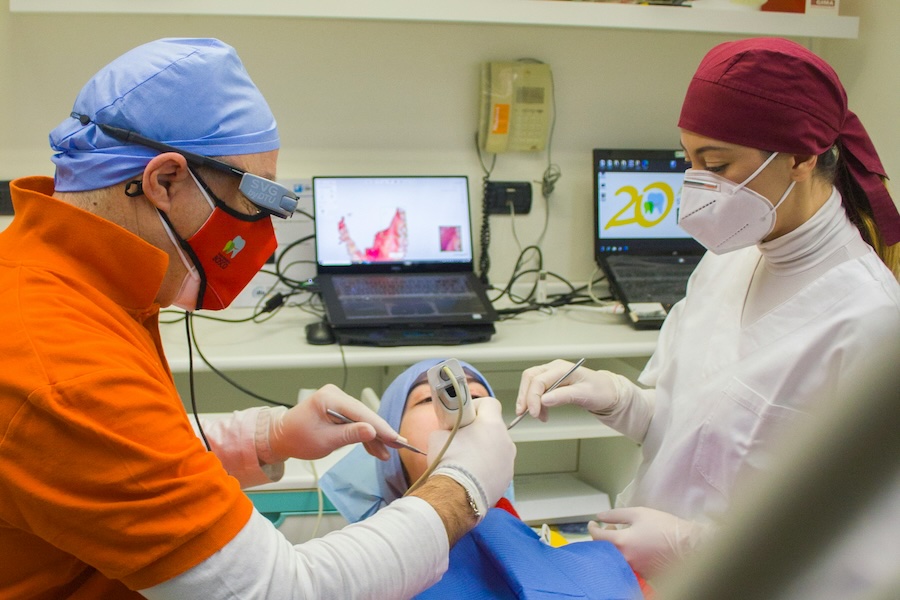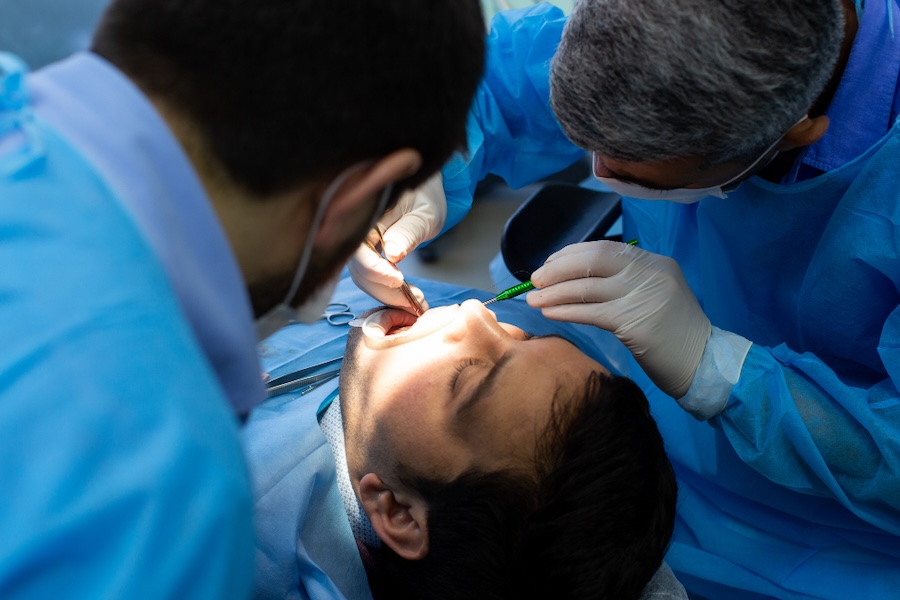Oral surgery is a specialized field of dentistry that focuses on the diagnosis, treatment, and management of conditions affecting the teeth, gums, jaws, and surrounding oral and facial structures. It offers a critical and transformative aspect of dental care in addressing complex issues that are beyond the scope of general dentistry.
Oral surgery encompasses a wide range of procedures that are designed to correct structural issues, remove diseased tissue, and enhance the aesthetics and functionality of the mouth and jaws.
From serial tooth extractions to intricate jaw and facial reconstructions, an oral surgeon can treat and prevent conditions that lead to significant discomfort, complications, and life-threatening situations. In the long-run, these procedures can significantly improve your overall quality of life. For complex concerns of the jaws and face, you can learn more about our maxillofacial surgery in Calgary.
In Calgary, we recognize the vital role of oral surgery in maintaining and restoring your oral health and overall well-being. With that, our clinic is committed to providing comprehensive surgical care with our team of experienced oral surgeons and trained dental staff.

Reasons for Oral Surgery
You may require the expertise of an oral surgeon if you have:
Severe Tooth Decay
Extensive tooth decay that cannot be saved with a filling or root canal must be removed to prevent further infection and damage to adjacent teeth. Complicated tooth extractions such as those with curved, crooked, or hooked roots can be challenging for a general practitioner, thus needing an oral surgeon.
Impacted Teeth
Usually the wisdom teeth or canines, impacted teeth can have varying degrees of difficulty depending on how embedded it is in the gums and bone. An oral surgeon can help provide a smooth and easy removal with fewer to no complications involved.
Missing Teeth Replacement
Lost teeth due to decay, injury, or other factors can be replaced with dental implants. This is a meticulous procedure that involves the surgical placement of an implant unit in the bone. This will hold the tooth replacement securely, whether it is a crown, bridge, or full denture.
Jaw Misalignment
Misaligned jaws can make chewing, eating, and speaking difficult. To align the jaws and improve their function and appearance, corrective jaw surgery can be performed.
Tooth Infections
Infection may arise secondary to dental decay, trauma, or failed root canal. Left untreated, tooth infections can cause widespread complications. Surgical intervention may be needed to remove all diseased tissue and prevent future problems.
Gum Infections
Advanced gum disease or periodontitis can affect the gums and bones that support the teeth. Tooth loss may occur if this is left to progress. To prevent further damage, surgery can help clean infected tissue, reshape the gums, and repair damaged bone.
Tumors and Cysts
Oral surgeons are trained to examine and remove benign or malignant growths of the mouth, jaw, and face. They work with other dental specialists to ensure proper diagnosis, comprehensive care, and long-term excellent prognosis.
Trauma and Injury
Accidents or injuries that damage the teeth, jaw, or facial bones require the help of oral surgeons to repair the damage and restore function and appearance.
Sleep Apnea
Patients with structural issues in the mouth or throat can experience difficulty in breathing and poor sleep quality. This can be fixed with the help of an oral surgeon.
Birth Defects
Congenital conditions such as cleft lip and palate can significantly impact a person’s ability to eat, speak, and breathe. Oral surgery can help correct these defects to improve the quality of life in the long term.
The Oral Surgery Process
While every surgery is different depending on what you need, the general process is usually the same for everyone. Here’s what to expect:
Initial Consultation
The first step is a thorough consultation with our oral surgeon. We will assess your overall condition, discuss your medical and dental history, and obtain diagnostic tools such as X-rays and scans. This will help us determine the best treatment plan for you.
Treatment Planning
Once we have determined the issue, the next step is to personalize your treatment plan depending on your unique needs. Our team will explain the procedure in detail, discuss the risks and benefits, assess your alternatives, and evaluate the predicted outcomes so you can better understand the process. Our goal is to ensure you are fully informed and comfortable with the treatment before we begin.
Surgical Procedure
On the day of your surgery, we will take every measure to ensure a positive experience during and after the procedure. Depending on the complexity of the procedure, you may receive local anaesthesia, sedatives, or general anaesthesia. The treatment difficulty will also determine the length of the treatment.
Postoperative Care
After the surgery, we will provide you and your caretaker, whether a family member or a friend, with detailed instructions for at-home care. This may include pain management, dietary guidelines, and tips for a speedy and healthy recovery. If needed, follow-up appointments will be scheduled to monitor your recovery.

Why Choose Us for Oral Surgery?
Choosing the right dental care provider is crucial for oral surgery. Here’s why our clinic in Calgary stands out among the rest:
Experienced and Skilled Oral Surgeons
Our oral surgeons and dental staff are highly trained and experienced to provide the proper care and treatment for a wide range of surgical procedures. Should your case be beyond our expertise, we will gladly refer you to our list of qualified specialists.
State-of-the-Art Technology
Our Calgary clinic is equipped with advanced technology to allow us to perform even the most complex surgeries with precision and efficiency. We also prioritize your safety by maintaining the highest standards of cleanliness and sterilization in our clinic.
Comfort and Safety
Using modern anaesthetic techniques and pain management options, we put your comfort as our top priority. This will provide a smooth and stress-free experience during your oral surgery.
Frequently Asked Questions (FAQs)
What is the recovery time for oral surgery?
The recovery time depends on the level of difficulty of the procedure. Recovery from an impacted wisdom tooth can take up to a week, while complex reconstructions can take months. Your oral surgeon will discuss the expected recovery time during your initial consultation.
What are the risks and complications?
As with any dental procedure, surgery comes with complications. While most procedures are generally safe, there is also potential for nerve damage, delayed healing, and uncontrolled bleeding, among many others.
How do I care for myself after surgery?
The most important tip is to follow your dentist’s post-surgical advice. Rest, keep the surgical area clean, follow good oral hygiene, take the prescribed medications, and be cautious with your dietary restrictions. These will help promote healing and minimize discomfort.
Conclusion
Whether you are dealing with a painful tooth, jaw alignment issues, or more complex reconstructive concerns, our team at Chinook Dental Group in Calgary is here to help.
If you believe you may need oral surgery, don’t hesitate to contact us today to schedule a consultation.